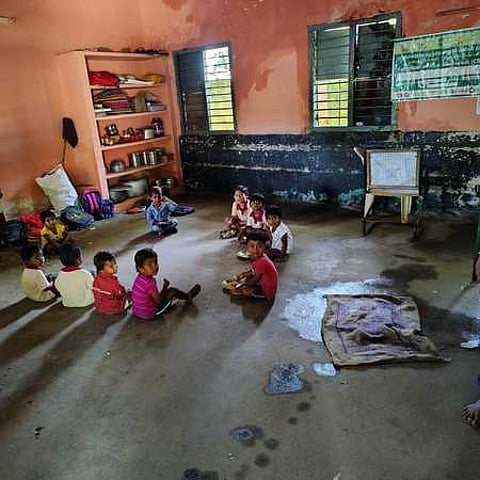41 per cent Anganwadis lack electricity, over 30 per cent have no toilet facilities
HYDERABAD: The absence of essential infrastructure in a significant number of Anganwadi centres across the state has sparked concern among child rights advocates.
Data accessed by TNIE reveals that nearly 41% of Anganwadi schools operate without electricity, while over 30% lack access to toilets — a stark violation of children’s right to a safe, healthy and dignified learning environment.
Alarmingly, in Siddipet district, represented by former chief minister K Chandrasekhar Rao, a staggering 71% of Anganwadi centres are functioning without electricity. A comprehensive analysis of infrastructure data from 35,700 Anganwadi centres (AWCs) across Telangana reveals a grim picture of foundational gaps in early childhood care facilities.
Basic amenities such as electricity, drinking water and toilets remain unavailable in thousands of centres, severely impacting the health, safety and educational prospects of children and workers alike.
The data shows about 41% of AWCs — 14,866 centres — do not have electricity. This critical shortfall undermines basic operational needs such as lighting, ventilation, use of fans during extreme weather and safe storage of nutritional supplements and vaccines.
District-wise, Siddipet tops the list, with 71.2% of its AWCs lacking power supply, followed closely by Nagarkurnool (70%), Jangaon (69.2%), and Medak (64%).
Speaking to TNIE, Anganwadi Workers Association general secretary Jayalaksmi said it becomes extremely difficult to take care of the children without electricity. She said that due to lack of power, they couldn’t adopt digitised teaching methods.
Equally alarming is the state of sanitation — 32.5% of Anganwadi centres, amounting to 11,595 units, do not have toilet facilities. This raises serious concerns over the safety and dignity of women staff and children.
Kumurambheem-Asifabad records the highest deficiency, with 70.4% of centres lacking toilets, followed by Nagarkurnool (56.7%), Narayanpet (55.1%) and Mahbubabad (51.1%). These figures starkly contrast with the goals of the Swachh Bharat Mission and child-friendly infrastructure guidelines.
Though slightly better than the other two indicators, 16.8% of AWCs (5,981 centres) do not have access to drinking water. Districts like Medchal-Malkajgiri (4.9%), Nalgonda (4.3%), and Vikarabad (7%) report relatively lower gaps. However, Mulugu (33.4%), Wanaparthy (33.7%), and Nagarkurnool (28.5%) continue to face acute shortages.
When contacted, a top official in the Women and Child Welfare Department said that they have already submitted proposals to the government, and 100% electrification will be implemented soon.

